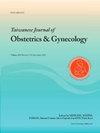控释地诺前列酮阴道给药系统宫颈成熟度不足的相关因素:单个围产中心的回顾性研究
IF 2.2
4区 医学
Q2 OBSTETRICS & GYNECOLOGY
引用次数: 0
摘要
目的在这项研究中,我们旨在评估与控释地诺前列酮阴道给药系统(Propess)宫颈成熟度不足相关的因素。材料和方法这项回顾性队列研究纳入了103名使用Propess进行引产的孕妇。结果49名参与者宫颈成熟度不够,54名参与者宫颈成熟度足够。对这两组进行的单变量分析表明,宫颈成熟度不足组的产妇年龄≥35岁、早产(胎龄在37周和38周之间)和插入时Bishop评分≤1的比例明显更高。多变量逻辑分析表明,产妇年龄≥35 岁(调整后的几率比:3.08,95% 置信区间:1.29-7.36,p = 0.011)和早产(调整后的几率比:3.17,95% 置信区间:1.23-8.20,p = 0.017)是普罗佩斯疗效差的独立相关因素。结论 在我们的研究中,高龄产妇和早产是使用普罗佩斯宫颈成熟度不足的独立预测因素。对于存在普罗佩斯疗效不佳相关因素的患者,可考虑根据产妇的个体因素制定引产方案,从而实现更有效的分娩管理。本文章由计算机程序翻译,如有差异,请以英文原文为准。
Factors associated with insufficient cervical ripening in a controlled-release dinoprostone vaginal delivery system: A single perinatal center retrospective study
Objective
In this study, we aimed to evaluate the factors associated with insufficient cervical ripening in a controlled-release dinoprostone vaginal delivery system (Propess).
Materials and methods
This retrospective cohort study included 103 pregnant women who used Propess for labor induction. The outcomes were the factors associated with insufficient cervical ripening, defined as a Bishop score ≤6 on the morning after Propess administration.
Results
Forty-nine participants had insufficient cervical ripening, and 54 had sufficient cervical ripening. Univariate analysis of these two groups showed that maternal age ≥35 years, early-term delivery (gestational age between 37 and 38 weeks), and Bishop scores at insertion ≤1 were significantly higher in the insufficient cervical ripening group. Multivariate logistic analysis showed that maternal age ≥35 years (adjusted odds ratio: 3.08, 95% confidence interval: 1.29–7.36, p = 0.011) and early-term delivery (adjusted odds ratio: 3.17, 95% confidence interval: 1.23–8.20, p = 0.017) were independent factors associated with poor Propess efficacy. Parity, pre-pregnancy body mass index, body mass index at delivery, and indications for labor induction were not associated with insufficient cervical ripening.
Conclusions
In our study, older maternal age and early-term delivery were independent predictors of insufficient cervical ripening with Propess. More effective delivery management can be achieved by considering induction protocols tailored to individual maternal factors for patients with factors associated with poor Propess efficacy.
求助全文
通过发布文献求助,成功后即可免费获取论文全文。
去求助
来源期刊

Taiwanese Journal of Obstetrics & Gynecology
OBSTETRICS & GYNECOLOGY-
CiteScore
3.60
自引率
23.80%
发文量
207
审稿时长
4-8 weeks
期刊介绍:
Taiwanese Journal of Obstetrics and Gynecology is a peer-reviewed journal and open access publishing editorials, reviews, original articles, short communications, case reports, research letters, correspondence and letters to the editor in the field of obstetrics and gynecology.
The aims of the journal are to:
1.Publish cutting-edge, innovative and topical research that addresses screening, diagnosis, management and care in women''s health
2.Deliver evidence-based information
3.Promote the sharing of clinical experience
4.Address women-related health promotion
The journal provides comprehensive coverage of topics in obstetrics & gynecology and women''s health including maternal-fetal medicine, reproductive endocrinology/infertility, and gynecologic oncology. Taiwan Association of Obstetrics and Gynecology.
 求助内容:
求助内容: 应助结果提醒方式:
应助结果提醒方式:


